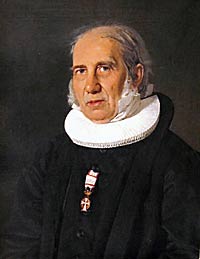Readings:
Psalm 86:1-12
Proverbs 3:1-2, 5-8
Romans 5:1-5
Matthew 8:5-10Preface of God the Holy Spirit
PRAYER (traditional language)
Almighty God, who didst build thy Church upon a rock: Help us remember, with thy hymn writer Nikolai Grundtvig, that though steeples may fall and buildings made by hands may crumble, Jesus makes our bodies his temple through the indwelling of the Holy Spirit. Help us to recognize Christ as the Way, the Truth and the Life, that we may join our voices to the eternal alleluia; through the same Jesus Christ, who with thee and the Holy Spirit livest and reignest, one God, in glory everlasting. Amen.
PRAYER (contemporary language)
Almighty God, you built your Church upon a rock: Help us remember, with your hymn writer Nikolai Grundtvig, that though steeples may fall and buildings made by hands may crumble, Jesus makes our bodies his temple through the indwelling of the Holy Spirit. Help us to recognize Christ as the Way, the Truth and the Life, that we may join our voices to the eternal alleluia; through the same Jesus Christ, who with you and the Holy Spirit lives and reigns, one God, in glory everlasting. Amen.
This commemoration was approved provisionally at General Convention 2009.
Return to Lectionary Home Page
Webmaster: Charles Wohlers
Last updated: 20 August 2009
NIKOLAI GRUNDTVIG
BISHOP AND HYMNWRITER, 8 Sept. 1872
 Nikolai Frederik Severin Gundtvig and Soren Kierkegaard are the two principal figures in Danish theology in the 19th century. Grundtvig was born in 1783, and at the age of 20 graduated from the University of Copenhagen with a degree in theology. At the University, he became absorbed in poetry and Norse mythology, and became convinced that poetry speaks to the spirit of man more richly than prose, and is the medium of choice for conveying and expressing spiritual truth. His book, Mythology of the North, published in about 1808, promotes this thesis. (this book is currently available only in Danish)
Nikolai Frederik Severin Gundtvig and Soren Kierkegaard are the two principal figures in Danish theology in the 19th century. Grundtvig was born in 1783, and at the age of 20 graduated from the University of Copenhagen with a degree in theology. At the University, he became absorbed in poetry and Norse mythology, and became convinced that poetry speaks to the spirit of man more richly than prose, and is the medium of choice for conveying and expressing spiritual truth. His book, Mythology of the North, published in about 1808, promotes this thesis. (this book is currently available only in Danish)
In 1810 his father, a pastor, fell ill and asked Nikolai to assist him with his parish. His first sermon, entitled "Why has the Lord's Word disappeared from His House?" caused an uproar, and led to his official censure, which gave him second thoughts about his calling. However, he was ordained the next year, and assisted his father until his father's death in 1813. It was a while before he got a parish of his own, and another denunciatory sermon of his led to his resigning the pulpit in 1826. In 1839 he was made chaplain at a home for aged women, a post that he kept for the remaining 33 years of his life. Meanwhile, he wrote books, including a version of Beowulf that advanced the study of Anglo-Saxon literature. He wrote more than a thousand hymns. (The Lutheran Book of Worship includes: "The bells of Christmas chime once more," "Bright and glorious is the sky," "Cradling children in His arm," "God's Word is our great heritage," "Spirit of God, sent from heaven abroad," "Peace, to soothe our bitter woes," and "Built on a rock the Church doth stand". The last of these is the most widely known and sung outside Lutheran circles.) His leadership helped to bring about the establishment of free public high schools for the masses in 1844, and the peaceful introduction of parliamentary government (retaining the monarchy) in 1849. In 1861, he was made a bishop, but without a diocese. He died 2 September 1872.
Danish immigrants to America tended to be pro-Grundtvig or anti-Grundtvig. The former (the "happy Danes") formed the American Evangelical Lutheran Church, while the latter (the "gloomy Danes") formed the United Evangelical Lutheran Church. Both of these are now part of the Evangelical Lutheran Church in America (ELCA), one of the two largest Lutheran bodies in the United States. The other large group is the Lutheran Church, Missouri Synod (LCMS), generally reckoned the more conservative (theologically) of the two.
by James Kiefer